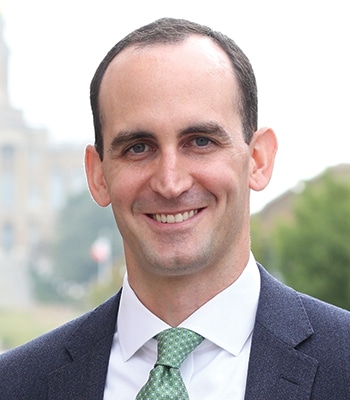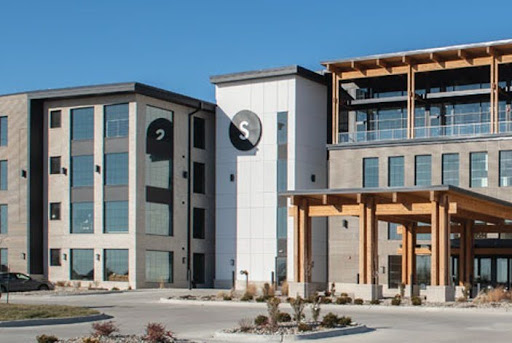IBC’s 2024 Competitive Dashboard shows manufacturing sector continues to lead Iowa’s economy
Challenges in population growth, mental health care access continue

Mike Mendenhall Feb 28, 2024 | 11:40 am
5 min read time
1,282 wordsAll Latest News, Economic Development, Statewide NewsIowa’s gross state product saw a more than 9.5% increase year over year in 2023, and the state’s median household income rose by 6%, suggesting continued annual economic growth, according to the Iowa Business Council’s annual Competitive Dashboard released today.

In the 2024 report, the Iowa Business Council also started tracking access to mental health care and active primary care providers in the state, which is an area the organization’s president, Joe Murphy, said shows “a lot of room for improvement.”
According to the report, Iowa was in a “strong financial position” as it entered 2024. The gross state product (GSP) rose from $216.9 billion in 2022 to $238.3 billion in 2023, and the median household income moved from $65,600 to $69,588 in the same time frame.
Iowa was No. 31 in the U.S. in both metrics compared to other states, but Murphy said when factoring in population size and a comparatively low cost of living, Iowa’s “competitive ability is really quite strong.”
“That speaks really well, I think, of the tenacity of Iowa companies large, medium and small for their ability to continue to turn out a really solid product and services that the country and the world demands,” he said.
The Iowa Business Council launched the annual Competitive Dashboard in 2011 as a tool to compare Iowa to the rest of the country. It uses public data from federal agencies and other nonpartisan research entities to determine the state’s rankings.
The nonpartisan, nonprofit Iowa Business Council is made up of 22 chief executives from the state’s largest employers.
The report ranks Iowa in five areas: economic growth, education and workforce, governance, health and wellness, and demographics and diversity.
Manufacturing remains Iowa’s top industry, according to the report. The dashboard shows that the state’s manufacturing value as a percentage of GSP was 16.5% in 2023, ranking No. 4 nationally. That’s down slightly from 17.8% of GSP activity in 2022.
The state’s labor participation rate was No. 6 in the U.S. in 2023 at 68.1%.
Murphy said the report is a “snapshot in time,” and slight movements in rankings are not a cause for concern.
“It just goes to show how diverse our economy is in Iowa with respect to manufacturing. But biosciences and agriculture and a strong entrepreneurial subset [are also prevalent], as well as a huge financial services portfolio across our state (and) obviously in Central Iowa,” Murphy said. “So, I’m not too concerned that we had a slight dip and maybe one ranking less than last year. I think that’s probably reflective of the economy as well, beginning to soften in some areas.”
Under governance, Iowa saw jumps in its corporate tax index and individual income tax competitiveness as legislation reducing both tax areas passed by the Legislature in 2022 took effect.
Iowa’s corporate tax index ranking moved from No. 34 nationally in 2022 to No. 29 in 2023. For individual income tax, Iowa jumped from No. 40 in the nation to No. 22, according to the dashboard.
Primary care and mental health
Murphy said that closing the gap with other states on access to mental health care providers will need increased public investment and has a direct impact on the state’s business climate.
The report shows Iowa had 207.4 mental health care providers per 100,000 residents in 2023 compared with 193.8 providers in 2022. The state ranked No. 43 in the nation in this area. Iowa fairs better with active primary care providers, ranking No. 26.
Murphy said part of the solution could be increased work-based learning programs for health care workers as well as financial incentives, including more investment in existing loan forgiveness programs to retain and draw providers to Iowa.
“We’ve done a lot of work on the advocacy side, and within our own [Business Council] companies over the last 18 months or so, on making sure that we’re aware and that we’re promoting mental health investment and policy changes at the state level,” Murphy said.
The report shows Iowa outperforming most states in the percentage of people lacking health insurance, ranking No. 5 with 4.5% of the population uninsured.
Population growth
Iowa saw a net migration increase in 2023 of nearly 1,500 people, according to the report.
Murphy said that’s encouraging, but it’s still an area where the Iowa Business Council wants to see more action to accelerate growth in Iowa’s urban and rural communities to retain and grow the workforce.
The state ranked No. 30 in the U.S. in five-year population change in 2023.
Murphy said the Iowa Business Council has had conversations with members of Iowa’s congressional delegation about supporting comprehensive immigration reform as one way to diversify Iowa’s workforce.
“I think we’re just trying to demonstrate the need, from a business perspective, that we need more people in the state, and that coalition should be broad and large,” Murphy said. “So, it should include not only business leaders but community leaders, state policymakers, municipal policymakers, all the way through the whole government system.”
The report also urges local and state lawmakers to “actively voice their support in passing comprehensive immigration reform to federal officials.”
Murphy acknowledged that the politics involved in immigration and U.S. border policy can make those conversations challenging.
“Just because it’s been long and arduous and complicated doesn’t negate the fact that we in the business community should continue to articulate that need,” he said. “That is a critically important economic development tool for our state, for our country, and we’ll continue to speak out on that cause and work with policymakers of both political parties toward that end.”
The Iowa Business Council’s recommended actions in the report include:
Economic growth: Continue work to ensure availability and an adequate stock of affordable workforce housing throughout the state to help attract and retain workers to fill jobs. In its report, the Iowa Business Council urged the Iowa General Assembly to adopt the Major Economic Growth Attraction Program to compete nationally to recruit new industries to Iowa. The program in Senate File 574, which includes a host of state tax incentives to lure $1 billion projects in advanced manufacturing, biosciences and research, was advanced by the House Ways and Means Committee last week after stalling at the end of the 2023 legislative session.
Education and workforce: The Iowa Business Council’s Business Education Alliance says in the report it will work with K-12 educational institutions and community school systems to develop “scalable, sustainable solutions” to provide work-based learning programs. These would include registered apprenticeship programs, quality pre-apprenticeship programs and high school internship opportunities.
Governance: Urge more movement to increase the “tax competitiveness” of Iowa’s corporate and individual income tax rates with other states to address talent migration into and out of Iowa. The Iowa Business Council supported a bill enacted in 2022 that will simplify the state’s income tax brackets and institute a flat 3.9% rate by 2026. Two bills moving through the Legislature this year could lower the income tax rate further and more quickly.
Health and wellness: More efforts to bolster health care workers, recruit more providers and increase public funding mechanisms. The report calls for a push to increase the number of mental health professionals in Iowa.
Demographics and diversity: Develop partnerships to create a marketing strategy to recruit people from “high-cost states” to come to Iowa to grow the state’s population. The report says the Iowa Business Council will work with federal policymakers to modernize the current immigration system, urge state and local policymakers to voice support in passing comprehensive federal immigration reform and support the Afghan Adjustment Act that would provide a path to permanent status to Afghans who were evacuated to the U.S. following the fall of Kabul in August 2021.

Mike Mendenhall
Mike Mendenhall is associate editor at Business Record. He covers economic development, government policy and law.










